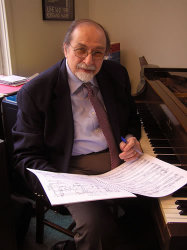November 6, 2006
_____________________________________________________ The Washington Post 11/06/06: Modern audiences have complicated ears. They’ve been drenched since birth in everything from Hildegard von Bingen to Camper Van Beethoven, from opera bouffe to bootleg Elvis. For better or worse, our ears reverberate with a universe of remembered and half-remembered music, all of which has shaped the way we listen. So shouldn’t contemporary composers write for those complex and contemporary ears?
The Washington Post 11/06/06: Modern audiences have complicated ears. They’ve been drenched since birth in everything from Hildegard von Bingen to Camper Van Beethoven, from opera bouffe to bootleg Elvis. For better or worse, our ears reverberate with a universe of remembered and half-remembered music, all of which has shaped the way we listen. So shouldn’t contemporary composers write for those complex and contemporary ears?
Composer Elliot Schwartz thinks so. He’s a card-carrying post-modernist who draws on almost any musical source or style that crosses his path, synthesizing college fight songs, 1960’s electronica and scraps of Schumann into vivid and wildly imaginative musical collages. Washington got a chance to hear some of this intriguing stuff on Friday, when the Cassatt Quartet (with pianist Aaron Shorr and the gifted English violinist Peter Sheppard Skaerved) played three of the composer’s best-known works at the Library of Congress.
The Cassatt opened with Schwartz’s 1980 quartet, the "Bellagio" Variations. It’s an exuberant whirlwind of a quartet; snippets of Beethoven and Mahler suddenly blossom out of Shwartz’s own writing, then just as suddenly change shape and evolve into something entirely new, always with compelling logic and grace. Shwartz’s style is cheerfully inclusive (“Shave and a Haircut” kept popping up) and even at its most arcane, when it can feel like a grad-school version of Name That Tune, feels coherent and alive; rewarding listening in every sense.
The composer’s other two works dug into deeper territory, using the same techniques of quotation and synthesis to explore aspects of the Holocaust (in “Tapestry” for piano trio) and the lives of two recently deceased friends (“Memorial in Two Parts” for violin and piano). Violinist Skaerved – a committed promoter of new music – turned in aggressive and convincing accounts of both works, accompanied with great style by Shorr and (in “Tapestry”) Cassatt cellist Nicole Johnson.
Two more traditional works fleshed out the program: a powerful if rather icy account of Franz Schubert’s Fantasy in C Major for violin and piano, and Maurice Ravel’s luminous and altogether delectable String Quartet in F Major, which the Cassatt played with equal parts elegance and fire – exactly what Ravel intended.